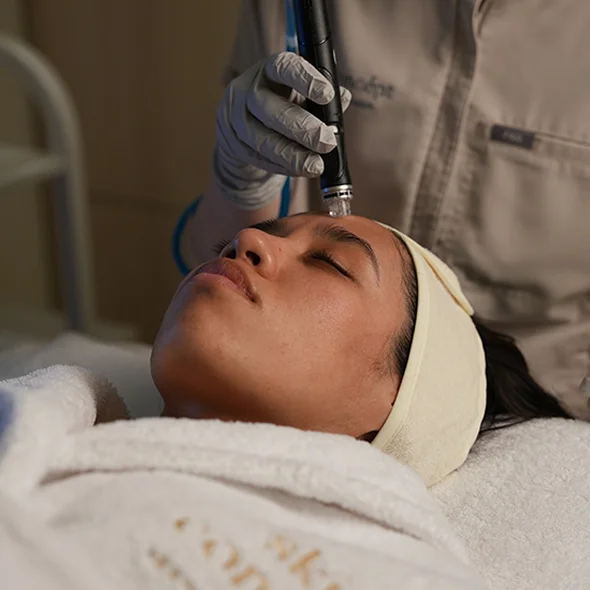Face & Beauty
Dermaplaning
Dermaplaning is a gentle exfoliation treatment that removes dead skin cells and peach fuzz using a specialized surgical blade. This non-invasive procedure instantly reveals smoother, brighter skin and helps your skincare products absorb more effectively. Dermaplaning leaves your complexion glowing with no downtime or irritation.


The Dermaplaning in action
Your esthetician gently glides a sterile blade across your face, removing dead skin and fine hair with precise, feather-light strokes. The treatment is painless, relaxing, and leaves your skin fresh and luminous right away.
First-Time Client Offer
Promo package
First-time Skin Concépt clients can enjoy these discounted options, with the same high-quality care and expertise that our loyal clients have come to love.
-
Signature HydraFacial $159
-
Deluxe HydraFacial $209

HydraFacial Services
Duration of treatments and prices

Signature HydraFacial
30 minutes
This powerful treatment is only 30 minutes but gets amazing results! Our Signature HydraFacial will deeply cleanse, exfoliate, and hydrate the skin with super serums filled with antioxidants, peptides and hyaluronic acid, leaving your face clean and glowing. You may choose to add on Lymphatic Drainage and/or PERK Lip and Eye Treatment.
-
1 session $170
-
3 sessions $480
-
6 sessions $700

Deluxe HydraFacial
30 minutes
This powerful treatment is only 30 minutes but gets amazing results! Our Signature HydraFacial will deeply cleanse, exfoliate, and hydrate the skin with super serums filled with antioxidants, peptides and hyaluronic acid, leaving your face clean and glowing. You may choose to add on Lymphatic Drainage and/or PERK Lip and Eye Treatment.
-
1 session $170
-
3 sessions $480
-
6 sessions $700
Treatment Information
What You Need to Know
Smooths texture
Removes dead skin cells for a silky-soft finish.
Brightens complexion
Instantly reveals a radiant, healthy glow.
Removes peach fuzz
Eliminates fine facial hair for flawless makeup application.
How it Works
Dermaplaning
Your esthetician expertly glides a sterile blade over your skin, tailoring the treatment to your skin’s texture and sensitivity for the best results.

Boosts product absorption
Helps serums and moisturizers penetrate deeper into the skin.
Non-invasive
Gentle and safe with no discomfort or downtime.
No irritation
Suitable for most skin types, including sensitive.
HydraFacial Contraindications
If you have experienced or are currently subject to any of these conditions, we strongly advise you not to proceed with the treatments as we prioritize our clients’ safety at all times.
- Pregnant or breastfeeding
- Active acne or infection
- Open lesion or cold sore
- Active sunburn
- Melanoma or lesions suspected of malignancy
- Skin conditions such as eczema, dermatitis, or rashes
- An autoimmune disease such as lupus
- A viral concern such as HIV or hepatitis
- Anticoagulants Therapy
Frequently Asked Questions
1. How often can I get dermaplaning?
Most clients schedule treatments every 4–6 weeks for the best results.
2. Does dermaplaning hurt?
No, the treatment is gentle and painless.
3. Will hair grow back thicker?
No, dermaplaning does not change the color or thickness of your facial hair.
4. Is there any downtime?
There’s no downtime; you can return to your day immediately.
5. Can I combine dermaplaning with other treatments?
Yes, it pairs well with facials, peels, and hydrating treatments.
6. Who should avoid dermaplaning?
Clients with active acne, open wounds, or certain skin conditions should avoid this treatment.
Ask us a question
Transform Your Skin With Our Dermaplaning in NYC
